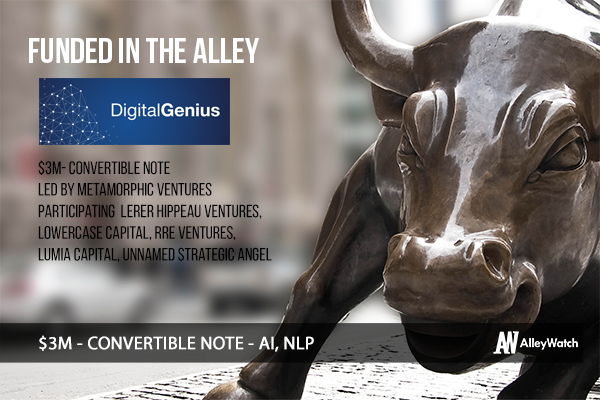We’ve all been there – reduced to frustration when dealing with automated customer service systems.
Press 4 for this. Press # for that but what usually gets lost is the human touch and often efficiency, which is what these very systems are designed to improve.
Enter Digital Genius. The company has built a sophisticated platform that integrates natural language processing and artificial intelligence so that customer service can be automated at a human level and at scale. Hot off a fresh capital raise, the company already is already being used by Fortune 500 early adopters including BMW and Unilever and was a finalist in this year’s TechCrunch Disrupt Battlefield in NYC.
Today Mikhail Naumov, President & CSO and Dmitry Aksenov, Founder & CEO join us to discuss the funding, the future of customer service disruption, and their expansion plans.
Who were your investors and how much did you raise? Was it seed, Series A, B, etc?
This was our first first round of institutional funding and the round was led by Metamorphic. Also participating in the round were Lerer Hippeau Ventures, Lowercase Capital, RRE Ventures, Lumia Capital, and one unnamed strategic angel in NYC.
Tell us about your product or service.
DigitalGenius is an artificial intelligence platform, which automates conversations between global brands and millions of consumers. The system enables brands to communicate with customers autonomously by replicating human-like conversations at scale.
What inspired you to start the company?
Years ago, the industrial revolution allowed us to ‘automate repetitive manual labor’, leading to a huge spike in output and productivity. The next stage of this process is the ‘automation of repetitive intelligent labor’. Our CEO, Dmitry Aksenov, has been building smart robots since 7 years old, and was initially inspired by the prospect of making the world of brand-to-consumer communication more meaningful and efficient.
How is it different?
The platform is based on well-engineered natural language processing (NLP) and proprietary AI modules which enable brands to automate meaningful conversations with millions of consumers, while maintaining the brand’s image and tone of voice.
What market you are targeting and how big is it?
Global brands within the Fortune-500. We have a great presence in the financial services sector, working with several Tier-1 banks to automate customer service, as well as other global brands in unrelated industries – like automotive, CPG, and more.
How did winning the Milken Institute Start-Up Challenge help your company?
The Milken Institute Global Conference convened the most impressive group of global leaders – with the desire and decision power to make substantial changes in the world. What’s different at Milken, is that ideas are not just discussed – but acted upon. One thing that supports this is their willingness to involve young and emerging technology companies in their high-level discussions. Therefore, winning the Milken Institute Startup Challenge gave us a major public forum and opportunity to discuss our vision and impact with a group of people that can make major decisions.
What motivated you to expand into NYC?
Having started and gained initial traction in the United Kingdom, it became apparent that global expansion is the best way to grow. One undeniable benefit of building a technology company, is it’s ability to expand across the planet with minimal infrastructure. However – to do this, we needed to be where most of our clients are (fortune 500 global brands), so we chose New York City as the center of our global operations and made a rapid expansion here this year.
What’s your business model?
SaaS. B2B focused on global brands in the fortune 500.
What was the funding process like?
Exciting & exhilarating. Each conversation was a tremendous opportunity to test our model and traction with a set of the smartest people in the tech world.
What are the biggest challenges that you faced while raising capital?
The biggest challenge when raising capital is inevitably the time-commitment it requires from the founders and executive team. By the end of the process we were thrilled to close and get back to building right away.
What factors about your business led your investors to write the check?
It would probably be best to quote our lead investor David Hirsch of Metamorphic Ventures:
“With the proliferation of NLP and AI, more and more applications will be built that solve consumer pain points,” explains David Hirsch, co-founder and general partner of Metamorphic Ventures. “The DigitalGenius team has built an amazing platform that enterprise customers and brands can leverage to increase customer satisfaction and reduce labor costs. I can’t wait to live in a world where interacting with the cable company is actually a pleasurable experience.”
What are the milestones you plan to achieve in the next six months?
- On board additional key talent on the engineering & business sides
- Continue our productization road map
- Continue deploying our platform with marquee clients
What advice can you offer companies in New York that do not have a fresh injection of capital in the bank?
- Figure out your business model, and metrics.
- Obtain relevant investor intros from people who are close to investors.
- Be willing to push through the tough times no matter what.
- If you’re in B2B, don’t rely just on investment capital. Get revenues as soon as possible.
Where do you see the company going now over the near term?
We aim to become the go-to platform for conversation automation technologies for the world’s biggest brands. Additionally, we know that this process will be wildly more exciting and impactful with the team of investors we have around the table. It is a very diverse round, and we could not be more excited to work with our new partners to build the future of this space.





